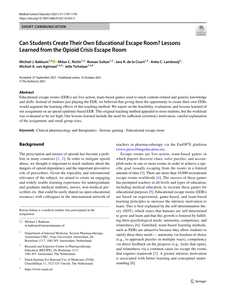Abstract Educational escape rooms (EERs) are live-action, team-based games used to teach content-related and generic knowledge and skills. Instead of students just playing the EER, we believed that giving them the opportunity to create their own EERs would augment the learning efects of this teaching method. We report on the feasibility, evaluation, and lessons learned of our assignment on an opioid epidemic-based EER. This original teaching method appealed to most students, but the workload was evaluated to be too high. Our lessons learned include the need for sufcient (extrinsic) motivation, careful explanation of the assignment, and small group sizes.
MULTIFILE

Digital educational escape rooms (DEERs) can provide an engaging gamified learning experience for students that is easy to use and sustainable for teachers. Though well-established in the STEM fields, where escape rooms often call for students to apply procedural skills, escape rooms are also used across a range of subjects to impact durable skills and attitudes such as communication, collaboration, and critical thinking. This paper seeks to extend the application of DEERs into social entrepreneurship (SE) education by exploring the DEER design elements relevant to the SE field. This paper will focus on developing durable skills and attitudes associated with social entrepreneurship, an area of entrepreneurship that seeks to create businesses with positive social impact. To identify the relevant design elements in DEERs, we conducted a systematic literature review. The research question was "Which design elements of digital educational escape rooms are necessary to teach social entrepreneurship skills and competencies?” This current paper builds on this type of framework by highlighting the relationship between the components of a DEER and learning objectives, specifically those relevant to a social entrepreneur’s educational context. For example, almost all papers reported successful collaboration in online groups. The authors also found that specific puzzle types were less important than the gamified context on impact on learning and skill development. Thus, the authors contribute to our understanding of how DEERs can relate to SE specific learning objectives, skills, and attitudes.
DOCUMENT
This paper aims to present a systematic literature review on state-of-the-art Educational Escape Rooms (EERs) with the use of digital technologies. More specifically, the focus of the study is to present the current developments and trends concerning Digital Educational Escape Rooms (DEERs) and investigate how they foster learning outcomes for online learners. Additionally, the present study provides insights into the design process of such technology enhanced EERs. This review is attributed to identifying and covering research gaps since the current literature has focused on the pedagogical aspects of Escape Rooms (ERs) in education, but no studies seem to have been conducted in regard to the pedagogical implications of Digital Escape Rooms (DERs) in educational environments. Based on the exhaustive literature review, an agenda for future research is promised and the implications for designing innovative ER approaches have been highlighted. The anatomy of the fundamental components of conducting systematic literature reviews was followed. The results of the review could be addressed to multidisciplinary teams related to education, game researchers, educational researchers, faculty members, scholars, instructors, and protagonists of educational systems to encourage them to thoroughly study the core elements of DEERs and how they can be applied in virtual educational contexts to facilitate students’ learning achievements.
DOCUMENT

Energy transition is key to achieving a sustainable future. In this transition, an often neglected pillar is raising awareness and educating youth on the benefits, complexities, and urgency of renewable energy supply and energy efficiency. The Master Energy for Society, and particularly the course “Society in Transition”, aims at providing a first overview on the urgency and complexities of the energy transition. However, educating on the energy transition brings challenges: it is a complex topic to understand for students, especially when they have diverse backgrounds. In the last years we have seen a growing interest in the use of gamification approaches in higher institutions. While most practices have been related to digital gaming approaches, there is a new trend: escape rooms. The intended output and proposed innovation is therefore the development and application of an escape room on energy transition to increase knowledge and raise motivation among our students by addressing both hard and soft skills in an innovative and original way. This project is interdisciplinary, multi-disciplinary and transdisciplinary due to the complexity of the topic; it consists of three different stages, including evaluation, and requires the involvement of students and colleagues from the master program. We are confident that this proposed innovation can lead to an improvement, based on relevant literature and previous experiences in other institutions, and has the potential to be successfully implemented in other higher education institutions in The Netherlands.